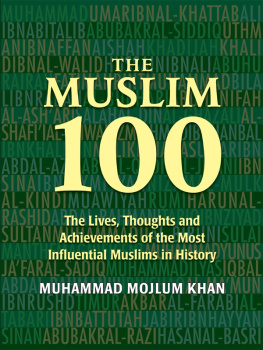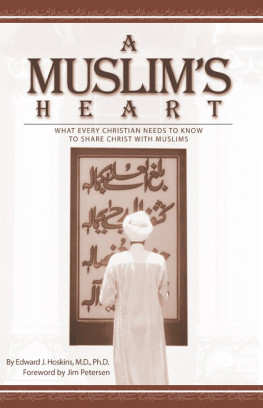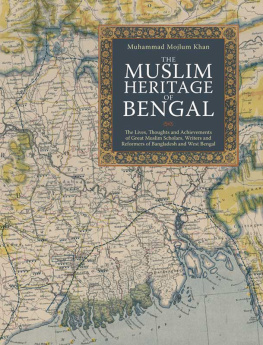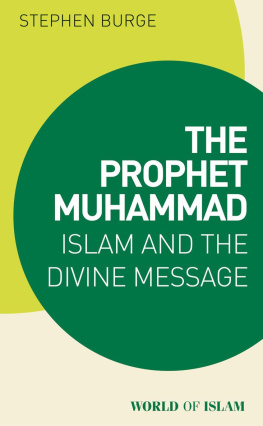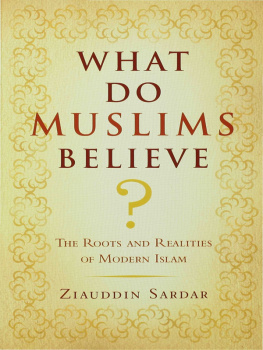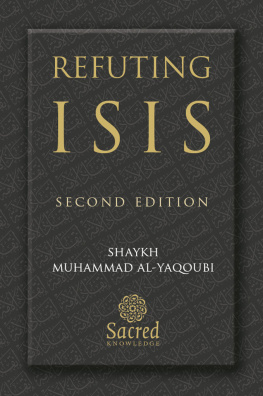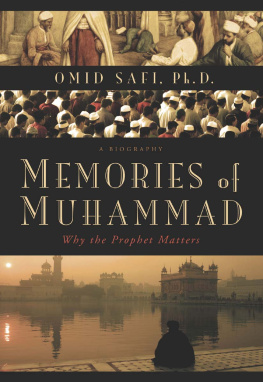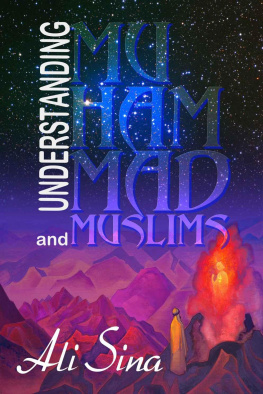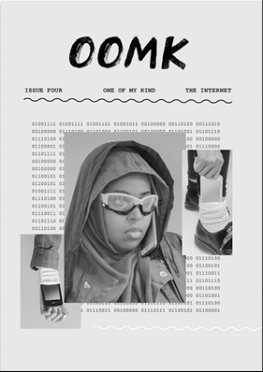Muhammad Khan - The Muslim 100: The Lives, Thoughts and Achievements of the Most Influential Muslims in History
Here you can read online Muhammad Khan - The Muslim 100: The Lives, Thoughts and Achievements of the Most Influential Muslims in History full text of the book (entire story) in english for free. Download pdf and epub, get meaning, cover and reviews about this ebook. year: 2009, publisher: Kube Publishing Ltd, genre: Religion. Description of the work, (preface) as well as reviews are available. Best literature library LitArk.com created for fans of good reading and offers a wide selection of genres:
Romance novel
Science fiction
Adventure
Detective
Science
History
Home and family
Prose
Art
Politics
Computer
Non-fiction
Religion
Business
Children
Humor
Choose a favorite category and find really read worthwhile books. Enjoy immersion in the world of imagination, feel the emotions of the characters or learn something new for yourself, make an fascinating discovery.
- Book:The Muslim 100: The Lives, Thoughts and Achievements of the Most Influential Muslims in History
- Author:
- Publisher:Kube Publishing Ltd
- Genre:
- Year:2009
- Rating:5 / 5
- Favourites:Add to favourites
- Your mark:
- 100
- 1
- 2
- 3
- 4
- 5
The Muslim 100: The Lives, Thoughts and Achievements of the Most Influential Muslims in History: summary, description and annotation
We offer to read an annotation, description, summary or preface (depends on what the author of the book "The Muslim 100: The Lives, Thoughts and Achievements of the Most Influential Muslims in History" wrote himself). If you haven't found the necessary information about the book — write in the comments, we will try to find it.
Short biographies of the most influential Muslims in history and today. A must-have book.
Muhammad Khan: author's other books
Who wrote The Muslim 100: The Lives, Thoughts and Achievements of the Most Influential Muslims in History? Find out the surname, the name of the author of the book and a list of all author's works by series.
The Muslim 100: The Lives, Thoughts and Achievements of the Most Influential Muslims in History — read online for free the complete book (whole text) full work
Below is the text of the book, divided by pages. System saving the place of the last page read, allows you to conveniently read the book "The Muslim 100: The Lives, Thoughts and Achievements of the Most Influential Muslims in History" online for free, without having to search again every time where you left off. Put a bookmark, and you can go to the page where you finished reading at any time.
Font size:
Interval:
Bookmark:
This book is dedicated to my late father
Muhammad Pathan Yawar Khan
(b. 1932 d. 1988)
He worked very hard and sacrificed everything for us;
may the Most Merciful shower His mercy on him.
First published by Kube Publishing Ltd,
Markfield Conference Centre
Ratby Lane, Markfield,
Leicestershire LE67 9SY
United Kingdom
Tel: +44 (0) 1530 249230
Fax: +44 (0) 1530 249656
Website: www.kubepublishing.com
Email:
Muhammad Mojlum Khan, 2008
All rights reserved.
2nd impression, corrected 2010
3rd impression, 2010
The right of Muhammad Mojlum Khan to be
identified as the author of this work has been
asserted by him in accordance with the
Copyright, Designs and Patents Act, 1988.
British Library Cataloguing-in-Publication Data
Khan, Muhammad Mojlum
The Muslim 100 : the lives, thoughts and achievements of the most influential Muslims in history
1. Muslims - Biography 2. Civilization, Islamic 3. Islamic countries - Civilization
I. Title
297.0922
Typeset in Adobe Garamond
Printed in the United Kingdom by Anthony Rowe
ISBNs
978-1-84774-006-9 paperback
978-1-84774-007-6 casebound
Cover and Page Design: Nasir Cadir
Typesetting: Naiem Qaddoura
Calligraphy: M. Swallay Mungly
Indexing: Abdassamad Clarke
Uthman Ibrahim-Morrison

EDMUND BURKE, the renowned Irish philosopher and statesman, once said, People will not look forward to posterity, who never look backward to their ancestors. Likewise, Aldous Huxley, the acclaimed English novelist, wrote, That men do not learn very much from the lessons of history is the most important of all the lessons that history has to teach. But what actually is history? Abd al-Rahman ibn Khaldun, the father of the philosophy of history, wrote in his famous Muqaddimah fil Tarikh (Introduction to History), History is a discipline that has a great number of approaches. Its useful aspects are very many. Its goal is distinguished. History makes us acquainted with the conditions of past nations as they are reflected in their national character. It makes us acquainted with the biographies of the prophets and with the dynasties and policies of rulers. Whoever so desires may thus achieve the useful result of being able to imitate historical examples in religious and worldly matters. The (writing of history) requires numerous sources and much varied knowledge.
Few historians would disagree with Ibn Khaldun that writing history requires numerous sources and much varied knowledge. I became fascinated by history, especially Islamic history, when I was in my early teens. To me the past is as important as the present, because without a proper understanding of the past we are unlikely to understand our present condition, and without a proper understanding of the present we will not be able to shape our future. Our past, present and future are therefore interconnected and interdependent. Indeed, I would go so far as to say our past is more important than our future, because we cannot control and shape our future if we are not aware of our past. Therefore knowing and understanding our history is not optional: it is a necessity. It is also true that the ancient Greek historians such as Herodotus of Halicarnassus and Thucydides of Athens wrote history as if history was no more than the unfolding of a sequence of events. Like them, the early Islamic historians such as Ahmad ibn Yahya al-Baladhuri, Ibn Jarir al-Tabari and Abul Faraj al-Isfahani also considered history to be a sequence of events. However, other Muslim historians like Abul Hasan al-Masudi, Abul Hasan Ali ibn al-Athir and Ibn Khaldun took a more logical and critical approach to history. The latter in particular sought to explore and identify the underlying causes or factors which triggered the sequence of events in the first place. That is why Ibn Khaldun considered history and philosophy to be two sides of the same coin. Therefore, in order to understand and fully appreciate history, he felt an understanding of philosophy was required and vice versa.
However, there is another group of historians who consider history to be no more than a playground for prominent peoples and personalities: as one famous historian said, There is properly no history: only biography. This view was reinforced by the German philosopher Friedrich Nietzsche who stated that history was no more than His-story. The proponents of this view are more concerned with the actors (historymakers), rather than the actions (the sequence of events or historical process as such). However, from an Islamic perspective history is not merely a sequence of events, nor is it entirely a playground for influential people and personalities; it is both of these things and more. Indeed, the Quranic approach to history is integrative, holistic and comprehensive in the sense that it acknowledges the role played by creative personalities (as Sir Arnold J. Toynbee put it), natural causes or phenomena and also direct Divine intervention in the process of history. Thus, according to the Quran, history is neither entirely pre-ordained nor wholly deterministic, like the Marxist and Hegelian notions of history and historical change. On the contrary it says, Surely, God will not change the condition of a people until they change their own condition. (13:11). And, God is on the side of those who fear Him, and do good. (16:128). Likewise, the Quran argues (see, for instance, Surat Hud verse 114) that the historical process is much more than a rigid chain of cause and effect unlike the views advanced by historians like Oswald Spengler. Instead, the notion of selectivity on the basis of moral imperative is central to the Quranic concept of historical change. God, says the Quran will not leave the believers in the condition in which they are until He separates the wrongdoers from those who are righteous. (3:179). Thus, in addition to time-space factors and the moral imperative, direct Divine intervention (whether in the form of reward or punishment) is also an integral part of the Quranic understanding of history and historical change. Say: He has power to send calamities on you, from above and below, or to cover you with confusion in party strife, giving you a taste of mutual vengeance each from the other. (6:65). And, The reward of God is best for those who believe and work righteousness: but this none shall attain, save those who steadfastly persevere. (28:80).
From the above discussion, it is clear that the Quranic concept of history, unlike the modern Western philosophies of history, is not only an integrative and multi-dimensional one, but is also based on a profound understanding of human nature and its possibilities. To his credit, Ibn Khaldun understood and appreciated this multi-layered approach to history, as is evident from his pioneering Muqaddimah fil Tarikh. Inspired by Ibn Khaldun and others, Arnold J. Toynbee also pursued a similar approach to history in his monumental A Study of History, but ultimately his notion of history was dominated by the Christian idea of a saviour rather than the Quranic view of man and his role and purpose in the universe. And remember Abraham was tried by his Lord with certain commands, which he fulfilled: He said: I will make you a leader to the nations. He pleaded: And also (leaders) from my offspring! He answered: But My promise is not within the reach of the wrong-doers. (2:124). And (remember) Noah, when he cried (to Us) aforetime: We listened to his (prayer) and delivered him and his family from great distressAnd remember David and Solomon, when they gave judgement in the matter of the field into which the sheep of certain people had strayed by night: We did witness their judgementAnd (remember) Job, when he cried to his Lord, Truly distress has seized me, but You are the Most Merciful of those that are merciful.And (remember) Ishmael, Enoch and Dhul-kifl, all (men) of constancy and patience And remember Zun-nun (Jonah)And (remember) Zachariah And (remember) her (Mary) who guarded her chastity: We breathed into her of Our Spirit, and We made her and her son (Jesus) a sign for all peoples. (21:76-91). In short, according to the Quran, the main purpose of history is to remind us of who we are, what our role and purpose is, and to learn lessons from the past.
Next pageFont size:
Interval:
Bookmark:
Similar books «The Muslim 100: The Lives, Thoughts and Achievements of the Most Influential Muslims in History»
Look at similar books to The Muslim 100: The Lives, Thoughts and Achievements of the Most Influential Muslims in History. We have selected literature similar in name and meaning in the hope of providing readers with more options to find new, interesting, not yet read works.
Discussion, reviews of the book The Muslim 100: The Lives, Thoughts and Achievements of the Most Influential Muslims in History and just readers' own opinions. Leave your comments, write what you think about the work, its meaning or the main characters. Specify what exactly you liked and what you didn't like, and why you think so.

